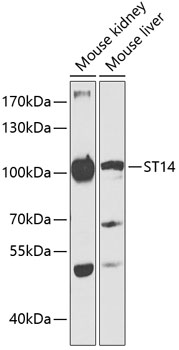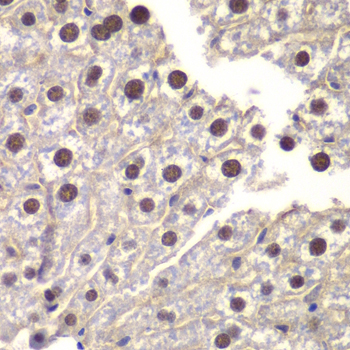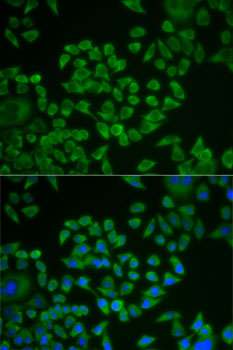-
Product Name
ST14 Polyclonal Antibody
- Documents
-
Description
Polyclonal antibody to ST14
-
Tested applications
WB, IHC, IF
-
Species reactivity
Human, Mouse
-
Alternative names
ST14 antibody; ARCI11 antibody; HAI antibody; MT-SP1 antibody; MTSP1 antibody; PRSS14 antibody; SNC19 antibody; TADG15 antibody; TMPRSS14 antibody; suppression of tumorigenicity 14 antibody
-
Isotype
Rabbit IgG
-
Preparation
Antigen: Recombinant fusion protein containing a sequence corresponding to amino acids 566-855 of human ST14 (NP_068813.1).
-
Clonality
Polyclonal
-
Formulation
PBS with 0.02% sodium azide, 50% glycerol, pH7.3.
-
Storage instructions
Store at -20℃. Avoid freeze / thaw cycles.
-
Applications
WB 1:500 - 1:2000
IHC 1:50 - 1:200
IF 1:50 - 1:200 -
Validations

Western blot - ST14 Polyclonal Antibody
Western blot analysis of extracts of various cell lines, using ST14 antibody at 1:1000 dilution.Secondary antibody: HRP Goat Anti-Rabbit IgG (H+L) at 1:10000 dilution.Lysates/proteins: 25ug per lane.Blocking buffer: 3% nonfat dry milk in TBST.Detection: ECL Basic Kit .Exposure time: 90s.

Immunohistochemistry - ST14 Polyclonal Antibody
Immunohistochemistry of paraffin-embedded mouse liver using ST14 antibody at dilution of 1:200 (40x lens).

Immunofluorescence - ST14 Polyclonal Antibody
Immunofluorescence analysis of U2OS cells using ST14 antibody . Blue: DAPI for nuclear staining.
-
Background
Degrades extracellular matrix. Proposed to play a role in breast cancer invasion and metastasis. Exhibits trypsin-like activity as defined by cleavage of synthetic substrates with Arg or Lys as the P1 site. Involved in the terminal differentiation of keratinocytes through prostasin (PRSS8) activation and filaggrin (FLG) processing.
Related Products / Services
Please note: All products are "FOR RESEARCH USE ONLY AND ARE NOT INTENDED FOR DIAGNOSTIC OR THERAPEUTIC USE"
